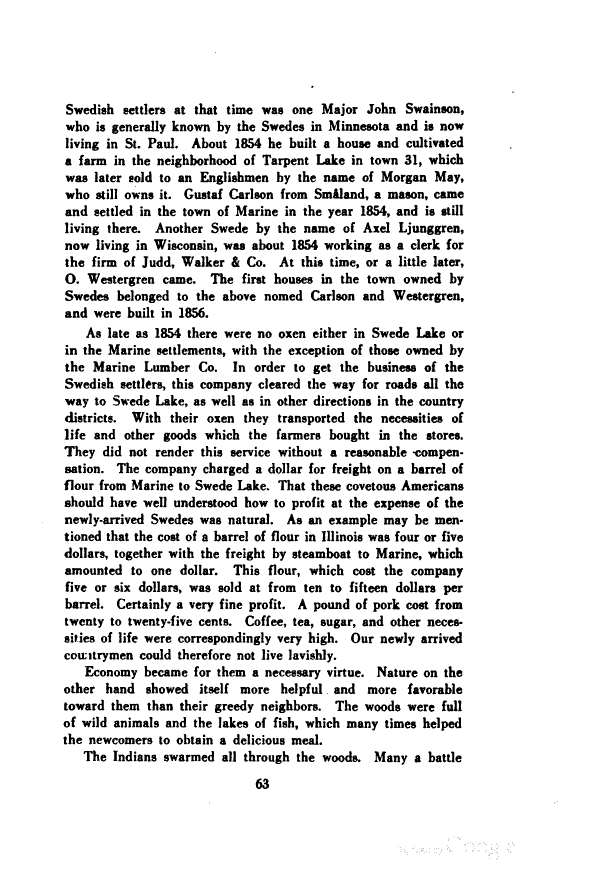
Full resolution (TIFF) - On this page / på denna sida - Sidor ...

<< prev. page << föreg. sida << >> nästa sida >> next page >>
Below is the raw OCR text
from the above scanned image.
Do you see an error? Proofread the page now!
Här nedan syns maskintolkade texten från faksimilbilden ovan.
Ser du något fel? Korrekturläs sidan nu!
This page has been proofread at least once.
(diff)
(history)
Denna sida har korrekturlästs minst en gång.
(skillnad)
(historik)
Swedish settlers at that time was one Major John Swainson,
who is generally known by the Swedes in Minnesota and is now
living in St. Paul. About 1854 he built a house and cultivated
a farm in the neighborhood of Tarpent Lake in town 31, which
was later sold to an Englishmen by the name of Morgan May,
who still owns it. Gustaf Carlson from Småland, a mason, came
and settled in the town of Marine in the year 1854, and is still
living there. Another Swede by the name of Axel Ljunggren,
now living in Wisconsin, was about 1854 working as a clerk for
the firm of Judd, Walker & Co. At this time, or a little later,
O. Westergren came. The first houses in the town owned by
Swedes belonged to the above nomed Carlson and Westergren,
and were built in 1856.
As late as 1854 there were no oxen either in Swede Lake or
in the Marine settlements, with the exception of those owned by
the Marine Lumber Co. In order to get the business of the
Swedish settlers, this company cleared the way for roads all the
way to Swede Lake, as well as in other directions in the country
districts. With their oxen they transported the necessities of
life and other goods which the farmers bought in the stores.
They did not render this service without a reasonable compensation.
The company charged a dollar for freight on a barrel of
flour from Marine to Swede Lake. That these covetous Americans
should have well understood how to profit at the expense of the
newly-arrived Swedes was natural. As an example may be mentioned
that the cost of a barrel of flour in Illinois was four or five
dollars, together with the freight by steamboat to Marine, which
amounted to one dollar. This flour, which cost the company
five or six dollars, was sold at from ten to fifteen dollars per
barrel. Certainly a very fine profit. A pound of pork cost from
twenty to twenty-five cents. Coffee, tea, sugar, and other
necessities of life were correspondingly very high. Our newly arrived
countrymen could therefore not live lavishly.
Economy became for them a necessary virtue. Nature on the
other hand showed itself more helpful and more favorable
toward them than their greedy neighbors. The woods were full
of wild animals and the lakes of fish, which many times helped
the newcomers to obtain a delicious meal.
The Indians swarmed all through the woods. Many a battle
<< prev. page << föreg. sida << >> nästa sida >> next page >>